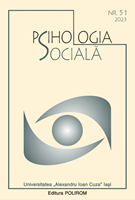Ideologies, political violence, the Open Science’s redeeming potential, and ethics
Ideologies, political violence, the Open Science’s redeeming potential, and ethics
Author(s): Cătălin MamaliSubject(s): Ethics / Practical Philosophy, Political Philosophy, Social psychology and group interaction, Social Theory, Studies in violence and power, Sociology of Politics
Published by: EDITURA POLIROM S.A.
Keywords: Ideologies; political violence; Open Science; communist ideology;
Summary/Abstract: The analysis started as a review inspired by a few excellent studies focused on ideologies nurturing political violence, on right wing, left wing, and religious extremism, and on Open Science. The range of the themes is wide. Nonetheless across these themes are series of questions that seems to be more connected than is usually recognized. First political violence, especially when it is comprehensive and enduring, some times over one hundred years, is inspired, supported, justified and guided by ideologies that claim to be based in the scientific approach of social reality. The omission of the relation between the communist ideology and the political violence is a costly error. Second, as democratic institutions, laws, the affirmation of human rights and the practice of civil resistance are developing the individual and collective social actors that have violent orientation and aspire to have a positive social image resort to tacit political violence. Tacit political violence resorts to a wide variety of means such as: economic marginalization and depreciation, financial constraints, cultural repression, non-declared denial of crimes against humanity, an imposed unjust motivational balance in social relations (those in the dominant positions are satisfying mainly self-actualization needs, and those in the dominated positions the survival needs), distortion of religious and moral value, and social isolation of the targeted individuals and social categories. Within the global context of the increased importance and influence of science, and of social sciences the state of the Open Science is extremely important. There are obvious remarkable achievements in the last few decades of the trend toward Open Science. The studies strongly suggest that the responsibilities, skills and resources of the researchers and reproducibility are, among other factors, essential. Within the context of scientific network the Open Science approach rightly indicates that the major „players” of this orientation are researchers, students, faculties, universities, libraries, journals, and funders. However, there is still missing a major player: the insiders, the participants, the subjects. I consider that the process of the Open Science should be inclusive in relation to the insiders and correct the structural epistemic, social and moral asymmetry between experts and insiders. The present short analysis cannot do justice to a wide range of ideas generated by researchers mentioned in the final thank you note, but it is deeply indebted to them.
Journal: Psihologia socială
- Issue Year: 1/2023
- Issue No: 51
- Page Range: 109-121
- Page Count: 13
- Language: English
- Content File-PDF

